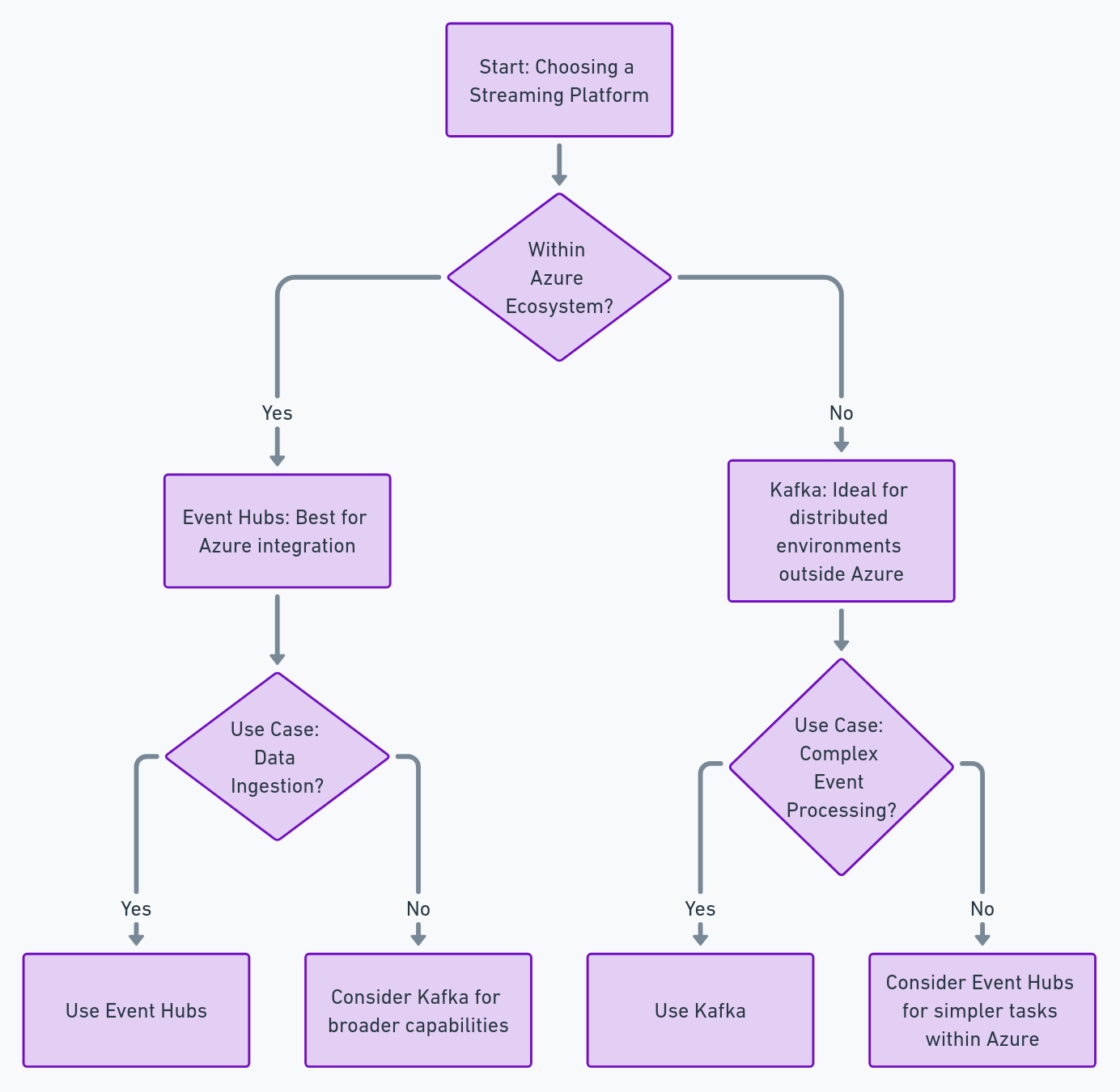Kafka vs Azure Event Hub
Introduction
Apache Kafka and Azure Event Hubs are both popular solutions for handling large-scale data streaming and event processing, but they have different features and are designed for different use cases.
Overview of Apache Kafka
Apache Kafka is an open-source distributed event streaming platform known for its high throughput, scalability, and durability. It's widely used for building real-time data pipelines and streaming applications.
Key Features of Kafka:
- High Throughput: Efficiently handles large volumes of data.
- Scalability: Scales horizontally to manage increasing data loads.
- Durability: Ensures data persistence with replication and disk storage.
- Ecosystem and Community: Has a large community and a rich ecosystem of tools and extensions.

Additionally, Apache Kafka has strengthened its role in real-time analytics by introducing Kafka Streams API. It provides stream processing that is efficient and user-friendly. This helps developers easily build sophisticated real-time analytics applications.
Use Cases for Kafka:
- Event-Driven Architecture: Ideal for complex event-driven systems.
- Real-Time Data Pipelines: Suitable for real-time data processing and analytics.
- Log Aggregation: Often used for collecting logs from distributed systems.
Favorable and Unfavorable Scenarios:
- Favorable: High-volume data streaming and complex event processing in distributed environments.
- Unfavorable: Simple event ingestion or lightweight integration tasks.
An Example:
E-commerce firms use Apache Kafka to handle large amounts of transaction data efficiently. This enables real-time processing of millions of transactions, facilitating instant inventory updates, immediate detection of fraudulent activities, and personalized customer experiences through real-time analysis of shopping behaviors.
Overview of Azure Event Hubs
Azure Event Hubs is a fully managed, real-time data ingestion service provided by Microsoft Azure. It is designed to handle massive amounts of event data from connected devices and applications.
The latest version of Azure Event Hubs offers enhanced security features, such as advanced encryption, network security improvements, and detailed access permission control. These aim to protect data during ingestion and streaming, ensuring data security throughout the entire process.
Key Features of Event Hubs:
- Fully Managed Service: Reduces the complexity of infrastructure management.
- High Throughput: Capable of handling millions of events per second.
- Scalability: Automatically scales to accommodate data throughput.
- Integration with Azure Ecosystem: Seamlessly integrates with other Azure services.
Use Cases for Event Hubs:
- Telemetry and Event Data Ingestion: Ideal for collecting data from IoT devices or applications.
- Data Streaming: Effective for streaming analytics pipelines in the Azure ecosystem.
- Big Data Integration: Can be integrated with big data analytics services in Azure.
Favorable and Unfavorable Scenarios:
- Favorable: Scenarios requiring a managed, scalable solution for event ingestion within the Azure platform.
- Unfavorable: Environments where full control over the streaming platform is needed or outside the Azure ecosystem.
An Example:
Azure Event Hubs can aggregate data from IoT devices in smart city initiatives, allowing real-time processing of traffic and environmental data. This enables immediate decision-making on urban management and public safety. It highlights the value of real-time, integrated data analysis in managing complex environments.
Comparison
Similarities:
- Event Streaming: Both are used for high-volume event streaming and real-time data processing.
- Scalability: Designed to handle large-scale data workloads.
Differences:
- Managed Service vs. Self-Managed: Event Hubs is a fully managed service, while Kafka requires manual setup and management.
- Integration with Ecosystem: Event Hubs offers native integration with Azure services, while Kafka is more platform-agnostic.
- Community and Ecosystem: Kafka has a larger community and a broader range of integrations and tools compared to Event Hubs.
Conclusion
Choosing between Kafka and Azure Event Hubs depends on the specific requirements of your project. Kafka is more suitable for scenarios that require a highly scalable and configurable streaming platform with a rich set of integrations. Azure Event Hubs is ideal for businesses already invested in the Azure ecosystem, looking for a managed service to handle large-scale event ingestion with minimal setup. Understanding the unique attributes of each platform is key to making the right decision for your data streaming needs.
